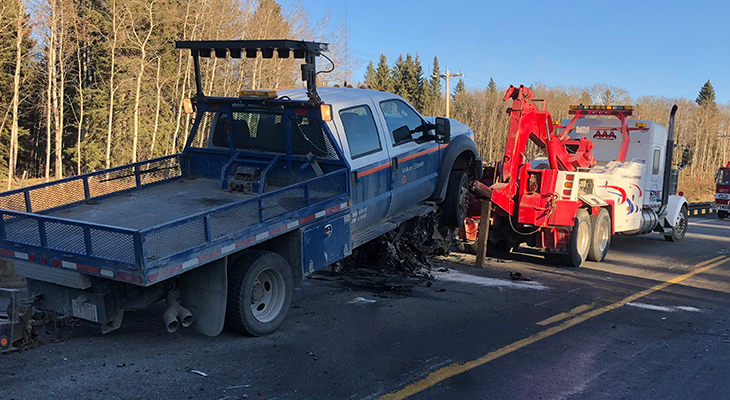Steps Towing Companies Take During Emergency Incident Responses
October 7, 2024

Towing companies play a critical role in ensuring safety and minimizing disruptions during emergency incidents. Whether it’s a road accident, vehicle breakdown, or natural disaster, towing companies are among the first responders, collaborating with other emergency services to manage the situation.
A well-coordinated response can make all the difference in preventing further damage and restoring normalcy. This blog explores the systematic steps towing companies follow to manage emergency incidents effectively, focusing on incident management as a key element.
The first step in any emergency towing response begins with receiving the call. Emergency incidents often involve chaotic situations, so clear communication is vital. Dispatchers take detailed information from the caller, including:
This information allows the dispatch team to assess the severity of the situation and assign the appropriate resources. The ability to gather and relay accurate details is critical for swift and effective incident management.
Once the initial assessment is complete, the towing company dispatches the right type of towing vehicle and equipment for the job. Different incidents require different solutions, and the towing team must be equipped to handle the specific needs of the situation. Common types of towing vehicles include:
Sending the correct type of vehicle ensures efficient resolution, preventing delays that could exacerbate the emergency situation.
In most emergency situations, towing companies work closely with other first responders, such as law enforcement, fire departments, and emergency medical teams.
Effective incident management involves seamless communication between these groups to ensure the safety of all parties involved and minimize disruption to traffic or public areas.
For example, in a multi-vehicle accident, the towing team may need to clear the roadway to allow emergency medical teams to access injured passengers. In such cases, collaboration is crucial.
Towing professionals may also coordinate with police to document the scene and remove vehicles in a manner that preserves any evidence needed for further investigations.
Upon arrival at the incident, the first priority is securing the area. Towing professionals are trained to assess the scene for any immediate dangers, such as fuel leaks, hazardous materials, or unstable vehicles. They often use cones, flares, and reflective equipment to mark off areas and prevent additional accidents.
Additionally, this phase of incident management involves determining the safest method of removing the vehicles or debris from the scene. Towing personnel are trained to evaluate vehicle conditions, road surfaces, and other environmental factors that could impact the safety and efficiency of their operations.
Once the scene is secured and assessed, towing professionals begin the process of recovering and removing the vehicles involved in the incident. This step involves using specialized tools and equipment, such as winches, cranes, or dollies, to carefully lift, tow, or transport vehicles away from the scene.
The goal is to remove all obstructions while ensuring no further damage occurs to the vehicles or the surrounding area.
During vehicle recovery, safety remains the top priority. Towing personnel often need to adapt to changing conditions, such as heavy traffic, adverse weather, or vehicle instability.
This requires a high level of skill and experience, especially in complex situations like overturned vehicles or vehicles stuck in precarious positions.
Once the vehicles are removed, the next step in emergency incident management is clearing and restoring the roadway. This involves ensuring all debris, fluids, or hazards are removed from the scene, allowing traffic to resume as soon as possible.
Towing teams often collaborate with road maintenance crews or emergency personnel to handle tasks like cleaning up oil spills, removing debris, or installing temporary barriers if needed.
Restoring the roadway to a safe, functional state helps prevent secondary accidents and reduces overall traffic congestion, which is especially important on busy highways or during peak traffic hours.
After the incident is resolved, towing companies are responsible for maintaining accurate records and documentation. This includes logging the details of the emergency, such as the type of vehicles involved, the actions taken by the towing crew, and any special equipment used during the recovery process.
Proper documentation is a crucial aspect of incident management, especially in cases where insurance claims, legal investigations, or future incident reviews may be required.
Towing companies typically provide detailed reports that are shared with law enforcement, insurance companies, and other relevant parties to ensure all aspects of the emergency have been appropriately handled.
To maintain a high standard of service during emergency responses, towing professionals undergo regular training and certifications. These training programs cover topics like safe towing practices, hazardous material handling, advanced recovery techniques, and first-aid response.
By staying updated on the latest industry standards and safety regulations, towing companies ensure their teams are always prepared to manage even the most complex and challenging incidents.
This ongoing commitment to preparedness is what enables towing companies to respond quickly and effectively when emergencies arise.
Technology has significantly enhanced the way towing companies manage emergency responses. Modern towing vehicles are equipped with advanced GPS systems, which help teams navigate to the scene as quickly as possible, avoiding traffic delays or road closures.
Additionally, digital communication tools enable dispatchers to remain in constant contact with towing teams and other emergency services. Real-time updates allow for better coordination and faster response times, which can be critical in life-threatening situations.
Another technological advancement is the use of incident management software that helps towing companies track resources, record data, and streamline communication. These tools not only improve operational efficiency but also contribute to safer, more effective responses during emergencies.
AAA Towing is a trusted provider of professional towing and roadside assistance services. With a commitment to fast response times and comprehensive incident management, we deliver safe and efficient solutions during emergency situations. Offering a wide range of services, including light to heavy-duty towing, we ensure the highest level of customer satisfaction with a focus on safety and reliability. Contact us today for more information.
We make sure each customer is completely satisfied before we leave the job.